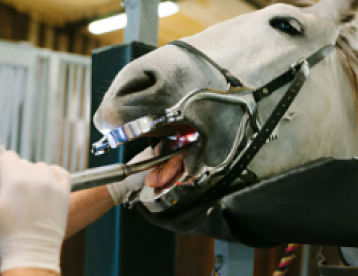Why Equine Dental Care is important:
Unlike human teeth, horses have teeth that grow continuously throughout their lives. With plant-based diets, horses extract nutrients from food by grinding and crushing plant fibres. This repeated activity combined with the anatomy of a horse’s mouth (the upper row of teeth sits wider than the loser row), among other reasons, can lead to abnormal wear patterns (malocclusion’s, enamel points, etc.), which can lead to various problems. Regular dental care can mitigate any problems, and in the long run, improve performance, decrease medical bills, and potentially lengthen your horse’s life, preventing pain/welfare issues.
Some Indications of Potential Dental Problems:
- Weight Loss
- Quidding
- Head Tossing / Shaking or Tilting
- Chronic Colic or Oesophangeal Obstruction (Choke)
- Loose Manure
- Change in Behaviour
- Foul Oral Odour or Nasal Discharge
What is involved in a dental work up?.
Physical exam, sedation, external exam of head and jaw, oral exam, floating, equilibration, and non-steroidal anti-inflammatory (Bute) if required.
A physical examination allows the veterinarian to note any gross abnormalities and customize the appropriate sedation amount for each horse. Sedation not only provides safety for the client, patient and staff. It also ensures patient compliance, when rinsing feed material from the mouth and placing an oral speculum (instrument for opening the mouth), for a thorough oral examination and dental float. It also allows a through external examination of the head and jaw. Lastly, a non-steroidal anti-inflammatory is sometimes recommended to decrease inflammation and soreness post dental. Please notify the veterinarian of any history of gastric ulcer, right dorsal colitis, or any pre-existing medical conditions along with current medications.
Our Equine Centre provides the perfect environment for performing dental work. This ensures safety and provides a head support for the horses comfort.
Post Dental
Most horses can return to normal activities in 48 hours, often the next day after the procedure. If the horse appears to be eating slowly then it may mean we need to continue the course of anti-inflammatories for longer. If possible they should have very light bitting contact in the mouth. Please inform us if your horse is not finishing its food, drinking normally, has very firm stools or is more listless or uncomfortable (excessive drooling, holding head in unusual manner etc) thank usual.
